5 Best No-Log VPNs — Most Private & Secure in 2025
- Best No-Logs VPNs — Full Analysis (Updated 2025)
- Quick Comparison Table: No-Log VPN Features
- Our Methodology for Testing No-Log VPNs
- Quick Guide: How to Set Up a No-Logs VPN in 3 Easy Steps
- What Does a No-Log VPN Actually Mean?
- Types of VPN Logs (And Which Ones You Should Be Concerned About)
- Analysis of the Best No-Logs VPNs
- VPN Services That Are Known to Keep Logs
- FAQs on the Best No-Log VPNs
- Get the Best No-Logs VPN
Many VPNs claim they don't keep logs, but few can actually prove it. This is concerning since your VPN provider has the power to track everything from your IP address to your entire browsing history. Without concrete evidence backing their no-logs claims, you're simply taking their word that your data is truly private.
Because of this, we extensively tested over 60 providers to find the best no-log VPNs. We examined independent audits, court documents, and technical implementations to separate genuine no-logs VPNs from those making empty promises. Our research also focused on providers' transparency about necessary operational data collection and whether they operate from privacy-friendly jurisdictions where governments can't demand user data
ExpressVPN emerged as the most trustworthy no-logs VPN. Its privacy practices have been verified through multiple independent audits and even proven in real-world situations. It’s also backed by a 30-day money-back guarantee, so you can test it risk-free and get a full refund if you’re not satisfied with the service. Editor's Note: Transparency is one of our core values at vpnMentor, so you should know we are in the same ownership group as ExpressVPN. However, this does not affect our review process.
Short on Time? Here Are the Best No-Logs VPNs in 2025
- Editor's ChoiceExpressVPN
Trustworthy no-logs VPN with more independent audits than any other service.Checked out by 7000+ users last month - Private Internet Access
Proven no-logs claims in real-life cases, but based in the US (5-Eyes jurisdiction). - CyberGhost
Transparency reports to confirm your data isn't shared, but it collects some user info. - NordVPN
Panama-based, so your data doesn’t need to be shared, but privacy policy raises concerns. - Surfshark
Warrant canary available for transparency but based in the privacy-unfriendly Netherlands.
Editor's Note: We value our relationship with our readers, and we strive to earn your trust through transparency and integrity. We are in the same ownership group as some of the industry-leading products reviewed on this site: Intego, Cyberghost, ExpressVPN, and Private Internet Access. However, this does not affect our review process, as we adhere to a strict testing methodology.
Best No-Logs VPNs — Full Analysis (Updated 2025)
1. ExpressVPN — Trustworthy No-Logs VPN With the Most Independent Audits

Tested April 2025
| Best Feature | 19 third-party audits to confirm ExpressVPN’s privacy policy and the security of its apps, browser extensions, and more |
|---|---|
| Security Features | AES 256-bit encryption, IP/DNS leak protection, and a kill switch make your data almost impossible to read |
| Server Network | 3,000 servers in 105 countries give you plenty of reliable, private connections |
| Simultaneous Device Connections | Protect up to 8 devices at the same time |
ExpressVPN delivers the highest level of privacy protection of any VPN we tested, and it doesn't store any data that can be traced back to you. Its privacy claims have been extensively verified through multiple independent audits. KPMG verified its no-logs policy twice in 2022 and 2023, while F-Secure and Cure53 conducted thorough security audits of its apps in 2022 to confirm they protect user privacy.
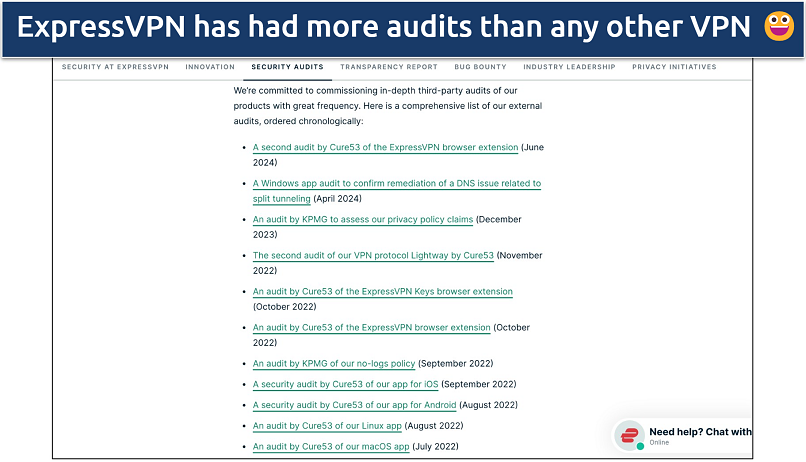 The list of ExpressVPN audits goes on to 2018, so it can't be captured in one screenshot
The list of ExpressVPN audits goes on to 2018, so it can't be captured in one screenshot
ExpressVPN’s TrustedServer technology (RAM-only servers) automatically wipes all data during each reboot, so your information isn’t stored on its servers either. Its British Virgin Islands jurisdiction adds another layer of privacy since the country has no data retention laws. More importantly, its privacy claims have been proven in real-world situations. When Turkish authorities seized one of ExpressVPN’s servers in 2017, they couldn't extract any user data.
Our speed tests showed impressive results across ExpressVPN's server network. For example, we only lost 5% speed on nearby servers and 18% on long-distance connections. These fast speeds make it perfect for torrenting large files privately. We could download a copyright-free 4 GB file in under 3 minutes.
Admittedly, ExpressVPN is more expensive than other VPNs on this list. However, it offers generous discounts throughout the year, which can make your subscription affordable. For added privacy, you can also pay with cryptocurrency. Plus, you can test it risk-free since it comes with a 30-day money-back guarantee. If you’re not satisfied with the service, getting a refund is easy.
Useful Features
- Verified browser extensions. ExpressVPN offers secure browser extensions to prevent WebRTC leaks. Unlike other VPN browser extensions, this acts as a “remote control” for the app, letting you protect your whole device with one click. Its browser extensions also undergo regular security audits, with the latest verification by Cure53 in 2024.
- Strong security features. The VPN uses perfect forward secrecy, which generates a new encryption key for each session. This means even if someone manages to decrypt one session, they can't access any of your previous or future data, helping to mitigate the impact of an attack on your privacy.
- Advanced Protection. This is a set of security features. Threat Manager blocks connections to known trackers and malicious websites to prevent companies from collecting your data and protect you from potential cyber threats. It also has a built-in ad blocker to prevent intrusive ads and improve your online experience.
- Bug bounty. ExpressVPN even has a bug bounty program to demonstrate its confidence in its technologies. It offers a $100,000 bonus to security researchers who can identify certain types of security vulnerabilities in its systems.
- One of the fastest VPNs
- Works with top streaming sites
- A proven no-logs policy
- Limited customization
- Smart Location isn't always the fastest
2. Private Internet Access — Court-Proven No-Logs Claims and Open-Source Apps for Maximum Transparency
| Best Feature | No-logs policy was proven in court twice, showing PIA adheres to its claims |
|---|---|
| Security Features | DNS/IP leak protection, RAM-only servers, and reputable protocols (WireGuard and OpenVPN) to protect your privacy |
| Server Network | 29,650 servers in 91 countries ensure privacy without compromising stability |
| Simultaneous Device Connections | Unlimited connections to protect all your devices with one subscription |
Private Internet Access (PIA) doesn't collect any sensitive information like your IP address, location, or browsing history. Its no-logs claims have been proven true multiple times in court. In 2016, when the FBI subpoenaed PIA for information during a criminal investigation, the VPN had nothing to share since it doesn't store any logs. The same year, Russian authorities seized some of its servers but found no user data.
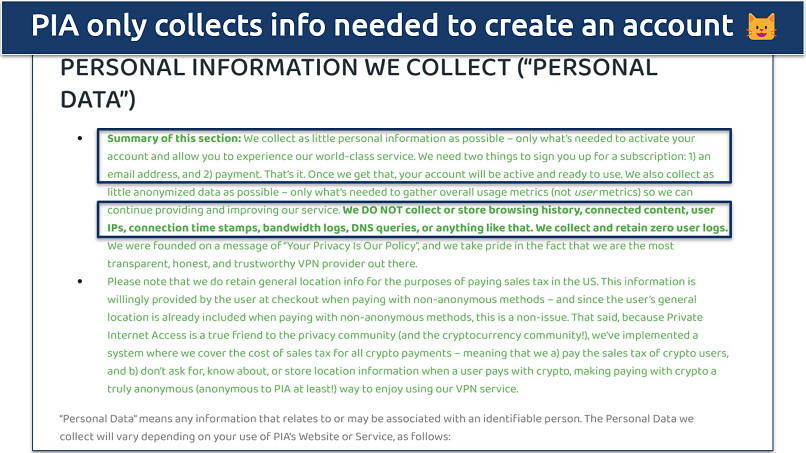 PIA is also one of the few VPNs that make their privacy policy clear and understandable
PIA is also one of the few VPNs that make their privacy policy clear and understandable
PIA’s privacy claims have also been verified through two independent Deloitte audits in 2022 and 2024, which confirmed its server infrastructure can't identify users or track their activities. These audits also validated PIA's dedicated IP token-based system that prevents IPs from being traced back to users.
My only complaint about PIA is that it's based in the US, one of the founding members of the 14 Eyes Alliance. It is, however, reassuring that all of its servers are privately owned and RAM-only. So, not only is your data regularly wiped from its servers, but the threat of third-party interference is minimized.
PIA offers great value for money — you can get it for $2.03/month with its long-term plan. It also comes with a tried-and-tested 30-day money-back guarantee, so you can try out PIA for free. If you don’t like it, getting a refund is quick and easy.
Useful Features
- Open-source apps. All of PIA’s apps are open-source, which means anyone can check them to verify there's no hidden tracking code. My team and I examined the code ourselves and found no concerning tracking functions. I also appreciated that the VPN has disabled error logs to ensure no metadata is stored.
- Customizable security. You can choose between AES 256-bit and AES 128-bit encryption to balance security and speed. While 256-bit offers maximum protection, 128-bit encryption provides faster speeds for streaming and torrenting. Plus, its MACE feature also blocks ads, trackers, and malicious websites while you’re connected for additional privacy.
- Advanced kill switch. PIA's kill switch can be configured to block you from going online without the VPN connected, which helps you avoid accidentally exposing any sensitive data.
- Multi-hop connections. PIA lets you route your traffic through both a VPN server and SOCKS5 proxy, adding an extra layer of privacy protection that makes it even harder to track your online activities.
- Many servers to choose from
- Customizable security settings
- Solid choice for torrenting
- Hit-or-miss customer support
- Tricky to navigate
3. CyberGhost — No-Logs VPN That Offers Quarterly Transparency Reports
| Best Feature | Regular transparency reports to prove its commitment to user privacy |
|---|---|
| Security Features | AES 256-bit encryption, kill switch, and Block Content feature to keep you safe from online threats |
| Server Network | 11,690 servers in 100 countries provide you with secure connections across the globe |
| Simultaneous Device Connections | Connect up to 7 devices simultaneously |
CyberGhost was one of the first VPNs to ever launch a transparency report showing the number of data requests received from legal authorities and copyright holders. Today, it continues to publish these reports quarterly on its site. This shows that CyberGhost is committed to upholding its no-logs policy, assuring that your data isn't stored or shared.
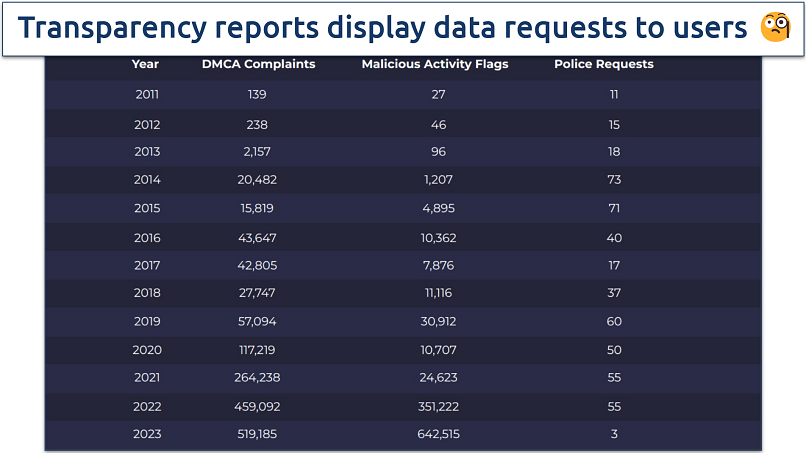 CyberGhost has been open about its requests for over a decade
CyberGhost has been open about its requests for over a decade
CyberGhost doesn’t monitor sensitive information, such as your browsing history, IP address, or DNS queries. Deloitte has assessed its no-logs policy twice — in 2022 and again in 2024 — confirming its high privacy standards. The audits showed its server setup prevents data collection and its dedicated IP system successfully keeps user accounts separate from their assigned IP addresses.
I found it a bit concerning that CyberGhost collects non-personal data, such as what type of device you’re using, your OS version, screen size and resolution, and so on. Other VPNs, like ExpressVPN and PIA, don’t log this kind of information. However, this data is completely anonymous and cannot be tied back to you.
CyberGhost’s monthly plan is a bit expensive, and it only comes with a 14-day refund period. However, its long-term plans include a generous 45-day money-back guarantee, so you can try CyberGhost for free.
Useful Features
- Based in Romania. Romania is outside the 14 Eyes Alliance, so it’s not obliged to share information with any organization or government.
- Privacy Guard. This feature is available on Windows, and it helps protect your privacy by disabling Microsoft's data collection tools and personalized ads. It gives you control over Windows' privacy-invasive features.
- NoSpy servers. Located in CyberGhost’s Romanian headquarters, these servers are fully managed by its team. This is a much safer approach than servers based in third-party data centers, as it guarantees no third-party involvement.
- Secure access to streaming
- Military-level security
- Designed for ease of use
- Slower long-distance servers
- Doesn't work in China
4. NordVPN — Panama-Based VPN With 4 Independent Audits of Its Logging Policy
| Best Feature | Based in a privacy-friendly jurisdiction, so it’s not obliged to share your data |
|---|---|
| Security Features | 256-bit encryption, proprietary NordLynx protocol, and IP/DNS leak protection to ensure your activities stay private |
| Server Network | 7,405 servers in 118 countries to prevent overcrowding while you secure your data |
| Simultaneous Device Connections | 10 simultaneous device connections under one license |
NordVPN is based in Panama, which has no data retention laws and is outside the 5/9/14 Eyes Alliance. Its privacy policy states that it doesn’t collect any personal information, like your IP address or traffic logs. And just like CyberGhost, it also regularly publishes transparency reports showing all legal requests it receives and how it handles them.
Deloitte has undertaken 4 separate audits of NordVPN's privacy policy, with the most recent one in December 2023. Each audit confirmed the VPN doesn't store any data that could identify users. In 2018, a third-party data center was breached, though no user logs were found. This security incident led NordVPN to make significant changes. In 2020, it started moving to colocated servers, and today it fully controls and manages its entire server network.
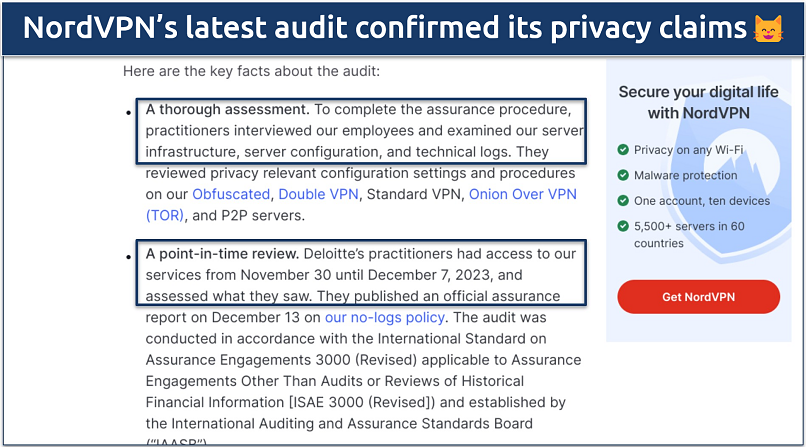 The audits show specifics, like which features or policies were examined
The audits show specifics, like which features or policies were examined
One concern is that NordVPN states it stores connection timestamps for 15 minutes after sessions end. However, these timestamps can't identify users or their activities, as proven by multiple independent audits.
All NordVPN plans come with a 30-day money-back guarantee, so you can receive a full refund if it’s not the right VPN for you. For extra privacy, you can pay with Bitcoin via BitPay.
Useful Features
- Dark Web Monitor. This feature scans the dark web and alerts you if your credentials linked to your email address are leaked. However, it’s a shame it's now only available on the Plus plan or above.
- Double VPN servers. These servers encrypt your data twice by routing it through two VPN servers instead of one. This adds an extra layer of privacy by providing double the encryption, but it does come with a larger speed drop.
- Great for torrenting. NordVPN clearly marks its P2P servers, making it easy to find the best ones for torrenting. If you opt for the Plus plan or above, the Threat Protection Pro feature also scans your downloads for malware.
- Strong security and privacy
- Fast local and faraway servers
- Great for streaming
- Some long connection times
- High renewal prices
5. Surfshark — Verified No-Logs VPN With a Public Warrant Canary
| Best Feature | A Warrant Canary ensures transparency regarding data requests from authorities |
|---|---|
| Security Features | CleanWeb blocks ads, trackers, malware, and phishing attempts to keep you safe online |
| Server Network | 3,200 servers in 100 countries keep your private connections running smoothly |
| Simultaneous Device Connections | No limit on the number of devices you can connect at the same time |
Surfshark has a Warrant Canary on its website, where you can see if it has received any legal orders to share user data. To date, it has received no National Security letters, gag orders, or warrants from government organizations. This gave me peace of mind that my data wouldn’t be shared with unwanted third parties.
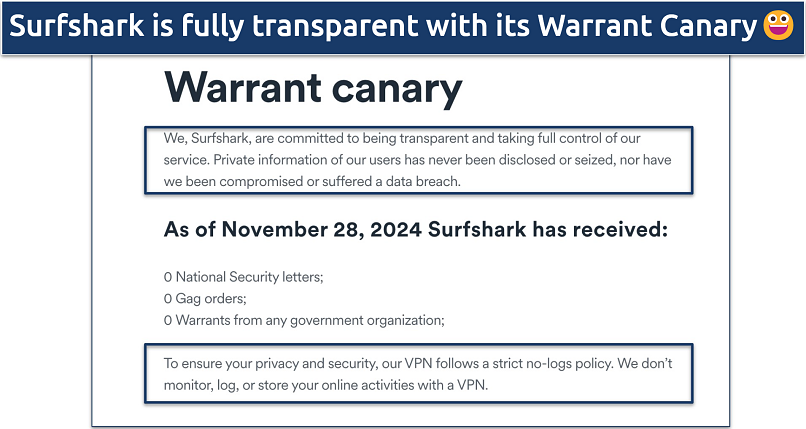 I was relieved to find out that Surfshark hasn’t been forced into sharing any user data
I was relieved to find out that Surfshark hasn’t been forced into sharing any user data
Surfshark collects no personally identifiable information. In 2022, it commissioned and successfully passed its first independent no-logs audit by Deloitte. In 2018 and 2021, cybersecurity firm Cure53 carried out audits on Surfshark browser extensions and server infrastructure, respectively, and no major vulnerabilities were found.
The only thing I didn’t like about Surfshark is that it’s based in the Netherlands. For maximum security, it’s much better for the VPN to be based outside the 5/9/14 Eyes Alliance. Still, its no-logs policy has been proven and verified, so even if a government organization requests data on a Surfshark user, there isn’t anything of use to share.
All of Surfshark’s plans are backed by a 30-day money-back guarantee, so you can try it without any risk and get a refund if it’s not the VPN for you.
Useful Features
- Camouflage mode. This feature hides the fact that you’re using a VPN. It boosts your privacy and allows Surfshark to work on restrictive networks, like at school or work.
- Alternative ID. Surfshark’s Alternative ID generates a brand new online identity and email address to use online that’s linked to your real email address to protect your identity.
- Rotating IP. This feature changes your IP address every few minutes, which helps to cover your footsteps if someone is tracing you.
- Easy to use
- Military-grade security
- Fast speeds
- Clunky torrenting support
- Based in a 9-Eyes country
- Might not work in China
Quick Comparison Table: No-Log VPN Features
The table below compares key privacy features of our recommended no-logs VPNs. I focused on crucial factors like jurisdiction, real-world privacy proof, and transparency reports. I also included practical details like speeds and monthly pricing to help you find a VPN that balances privacy with performance.
Editor's Note: We value our relationship with our readers, and we strive to earn your trust through transparency and integrity. We are in the same ownership group as some of the industry-leading products reviewed on this site: Intego, Cyberghost, ExpressVPN, and Private Internet Access. However, this does not affect our review process, as we adhere to a strict testing methodology.
Our Methodology for Testing No-Log VPNs
We focused our testing on verifying the legitimacy of no-logs claims through multiple verification methods. First, we examined independent audits and analyzed both the scope and frequency of these privacy assessments. We also investigated real-world cases where VPNs were subpoenaed or had servers seized, looking for concrete proof they couldn't provide user data.
My team carefully assessed the technical implementations that support privacy promises. This included confirming the use of RAM-only servers, examining server infrastructure ownership, and verifying the effectiveness of its security features. We also evaluated each VPN's jurisdiction and its implications for data retention. Then, we looked at other factors like speeds and security. For a complete breakdown of our analysis, please check out our VPN testing methodology page.
Quick Guide: How to Set Up a No-Logs VPN in 3 Easy Steps
- Download a VPN. I recommend ExpressVPN thanks to its strict no-logs policy, numerous independent audits, and excellent performance.
- Check the kill switch. Make sure it's enabled if it isn't on by default to prevent data exposure if your connection drops unexpectedly.
- Start browsing securely. Connect to a server and go online knowing your data isn't being logged or monitored by your VPN.
Editor's Note: Transparency is one of our core values at vpnMentor, so you should know we are in the same ownership group as ExpressVPN. However, this does not affect our review process.
What Does a No-Log VPN Actually Mean?
A no-logs VPN means the provider doesn't store any data that could identify you or your online activities. This includes your IP address, websites you visit, files you download, or the content of your internet traffic. However, many VPNs that claim to be "no-logs" still collect some basic data to maintain service quality.
Even the most private VPNs need to temporarily store certain information, like your email address, for account management and temporary connection data to prevent abuse. The best VPNs protect this necessary data through various methods. For example, they anonymize it so it can't be linked to specific users, encrypt it with military-grade encryption, and delete it automatically after use.
Some providers use token-based systems for their features (like dedicated IP addresses) to ensure no user data can be traced back to individual accounts.
That's why it's important to look for VPNs that have verified their no-logs claims through independent audits or real-world situations. The best no-logs VPNs are transparent about what minimal data they collect and have verified that this information can't identify users or their activities. Their privacy policies should be clear about why this data is collected and how it’s stored.
A genuine no-logs VPN should also use RAM-only servers that automatically wipe all data during each reboot. It’s even better if they operate from privacy-friendly jurisdictions where they aren't required to keep logs. To see why we recommend this, take a look at our guide to the 5/9/14 Eyes Alliance.
Types of VPN Logs (And Which Ones You Should Be Concerned About)
VPNs can collect different types of logs, and it's important to understand what each means for your privacy. Some logs are necessary for maintaining service quality, but others can expose your online activities.
Here's what different VPN providers might collect:
- Usage logs (most concerning). Your browsing history, websites visited, files downloaded, and search queries. These logs can reveal everything you do online and should be avoided at all costs.
- Connection logs (moderately concerning). Your IP address, VPN server IP, connection timestamps, and bandwidth usage. While less invasive than usage logs, this data could still be used to identify you and your activities if handled and stored incorrectly.
- Diagnostic logs (least concerning). Basic information like app version, device type, and successful/failed connections. This data helps VPNs maintain their service and usually can't be traced back to individual users.
The best VPNs either collect no logs or only gather minimal diagnostic data that's immediately anonymized and regularly deleted.
While not technically a log, all VPNs will collect some personal information for account management purposes. This is usually data like your email address, username, password, and payment information. However, there are ways you can minimize the information you hand over. You can use a “burner” email address that you only use for this account, a unique username and password, and some providers support cryptocurrency payments.
Analysis of the Best No-Logs VPNs
Here’s a more in-depth analysis of the specific data I found that each VPN stored. Each of the VPNs stores your email address, along with payment information, as it needs this information to create your account.
Some VPNs collect aggregated data — in short, this is a data summary created from a range of information, so it doesn’t contain individual data points. It’s required to maintain customer support and improve their service, but this data cannot be traced back to you. I’ve also considered whether your bandwidth data, browsing data, and IP address are stored.
| Email Address | Connection Timestamps | Bandwidth Data | Browsing Data | IP Address | |
| ExpressVPN | Yes | No | No | No | No |
| PIA | Yes | No | No | No | No |
| CyberGhost | Yes | Aggregated | Aggregated | No | Aggregated |
| NordVPN | Yes | No (stored temporarily and then deleted) | No | No | No (stored temporarily and then deleted) |
| Surfshark | Yes | Yes | No | No | No |
VPN Services That Are Known to Keep Logs
While researching the best no-logs VPNs, I came across a few services that have been known to collect and store user logs. Here are the VPNs you should avoid.
- Hola. A popular free service that’s actually a peer-to-peer proxy network. It doesn't provide any encryption, and its privacy policy openly admits to collecting your IP address, web pages you visit, time spent on those pages, access times, and dates, among other details.
- BolehVPN. It admits to storing logs when it detects suspicious activity or as a last resort for troubleshooting. Without more detail about when this occurs, I find it quite concerning.
- ThunderVPN. Another free VPN service that admits to logging your IP address, your choice of server, and the times you connected, among other things.
- Betternet VPN. Its no-logs policy is vague at best. Betternet claims it doesn’t log your browsing activity, but it holds onto some personal information “if required by law or for our legitimate interests.” However, it doesn’t say what data it collects, nor does it give much information about where it’s stored.
- VPNBook. VPNBook’s privacy policy is short and vague. It confirms that it collects your IP address and the time the connection was made and stores this information for one week.
- Opera VPN Pro. Opera VPN’s privacy policy is also extremely vague. It states that neither its free nor paid version logs your activities. However, I was concerned that its privacy policy says, “We do not promise that the service is absolutely secure,” as it’s provided by a third party.
FAQs on the Best No-Log VPNs
How do I know if my VPN keeps logs or not?
The most reliable way to verify a VPN's no-logs claims is through independent audits and real-world proof. Look for VPNs that have undergone third-party audits by reputable firms like KPMG, Deloitte, or PwC. These audits examine the VPN's infrastructure and confirm whether it actually collects logs.
Court cases and server seizures provide even more substantial evidence. When authorities can't extract user data from a VPN's servers, it proves the service truly doesn't keep logs. You can also check if the VPN publishes regular transparency reports showing how it handles government data requests.
Always read the VPN's privacy policy carefully. Legitimate no-logs VPNs are transparent about any data they need to collect and explain how they protect it. You should be wary of vague privacy policies that don’t provide any meaningful explanations.
Will a no-logs VPN keep me anonymous?
We cannot guarantee that any VPN will keep you completely anonymous. A no-logs VPN can significantly enhance your privacy online by not keeping records of your internet activity. However, most VPNs will require your email address and payment information to create your account. To keep your information more private, consider signing up with a disposable email address (if the company allows this) and paying with cryptocurrency.
Are no-logs VPNs legal?
Yes, no-logs VPNs are legal in most countries. Using a VPN that doesn't keep logs is a legitimate way to protect your online privacy. Many people use no-logs VPNs to secure sensitive data and maintain confidentiality.
However, some countries restrict or ban VPN use entirely. In China, you can only use government-approved VPNs, while other countries like North Korea and Iraq have outright bans. Be sure to check your local rules and regulations regarding VPN use to ensure you’re staying compliant.
Can I be tracked or hacked while using a no-logs VPN?
Yes, you can still be tracked or hacked even when using a no-logs VPN, but the risk is significantly lower. A VPN encrypts internet traffic and hides your IP address, but it can't protect you from all online threats.
For instance, if you log into your social media accounts or accept browser cookies, websites can still track your activities. Hackers could also compromise your device through malware or phishing attacks — the risk is higher when your VPN doesn’t have a malware blocker. They also can’t fully protect you against browser fingerprinting and other advanced tracking methods. Take a look at our guide to online privacy to learn more about these techniques.
The best way to stay safe online is to combine a no-logs VPN with good security practices. Use strong passwords, enable two-factor authentication, keep your software updated, run regular antivirus scans, and be careful about clicking unknown links or downloading files.
What is the best no-logs VPN for Android and iPhone?
All our recommended no-logs VPNs have dedicated Android and iOS apps, so you can use them safely on your mobile devices. Some of them have even undergone third-party security audits on their mobile and desktop apps, so you can be sure that your info will be kept safe while using them.
Are no-logs VPNs safe?
Yes, no-logs VPNs with proven track records are safe to use. The best providers protect your privacy through multiple security measures — they use military-grade encryption, run regular security audits, maintain RAM-only servers, and operate from privacy-friendly jurisdictions.
However, not all VPNs claiming to be "no-logs" are trustworthy. Look for providers that have verified their claims through independent audits and real-world situations. They should also be transparent about their privacy practices and any minimal data they need to collect.
Are there any free VPNs that don’t keep logs?
It's very rare to find genuine no-logs free VPNs. Running a secure VPN service requires significant resources. That's why most free VPNs collect user data to cover operational costs. I recommend using a premium no-logs VPN with a money-back guarantee instead — this way you can test all features risk-free and get a refund if you're not satisfied.
Our recommended free VPNs are all from reputable providers and only keep minimal logs that can't identify you. These tend to be “freemium” services that provide a free service supported by a paid tier. However, they come with major limitations, like data caps, restricted servers, and slower speeds. Plus, they rarely undergo independent audits to verify their privacy practices.
Get the Best No-Logs VPN
When looking for the best no-logs VPNs, always pick one that collects no personally identifiable information. After all, the main purpose of a VPN is to keep your online activity hidden from your ISP. If it stores and shares data that can be traced back to you, it’s simply not worth purchasing.
The most trusty no-logs VPN we’ve tested is ExpressVPN. Its no-logs policy has been proven true by numerous audits, and its RAM-only servers ensure your data is never stored in the first place. Plus, it comes with a 30-day money-back guarantee, so you can try ExpressVPN without financial risk. After canceling my subscription, I got a full refund just a few days later.
To summarize, these are the best no-logs VPNs…
Editor's Note: We value our relationship with our readers, and we strive to earn your trust through transparency and integrity. We are in the same ownership group as some of the industry-leading products reviewed on this site: Intego, Cyberghost, ExpressVPN, and Private Internet Access. However, this does not affect our review process, as we adhere to a strict testing methodology.


Your data is exposed to the websites you visit!
Your IP Address:
3.20.236.180
Your Location:
US, Ohio, Columbus
Your Internet Provider:
The information above can be used to track you, target you for ads, and monitor what you do online.
VPNs can help you hide this information from websites so that you are protected at all times. We recommend ExpressVPN — the #1 VPN out of over 350 providers we've tested. It has military-grade encryption and privacy features that will ensure your digital security, plus — it's currently offering 61% off. Editor's Note: ExpressVPN and this site are in the same ownership group.
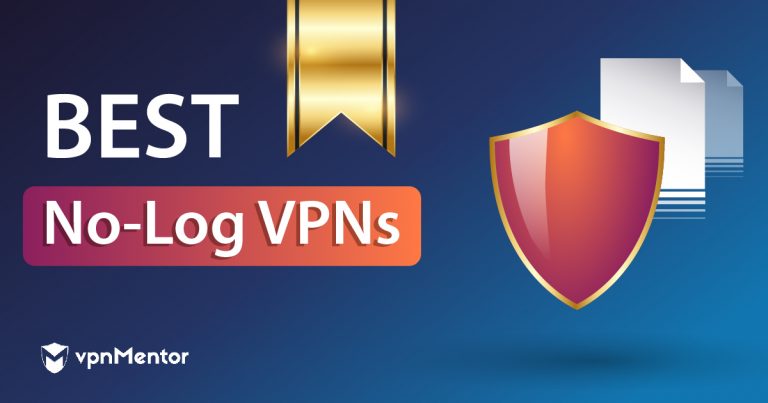







Please, comment on how to improve this article. Your feedback matters!